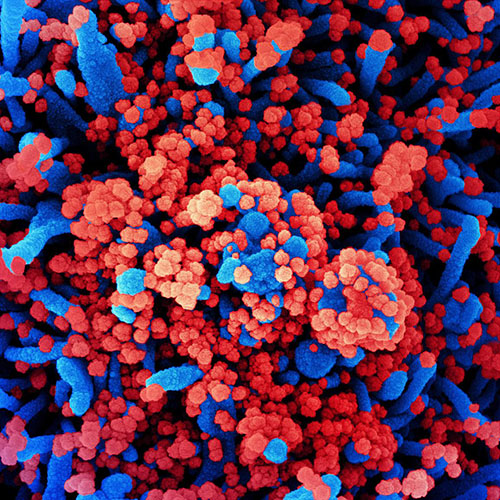Scientists discover genetic and immunologic underpinnings of some cases of severe COVID-19
New findings by scientists at the National Institutes of Health and their collaborators help explain why some people with COVID-19 develop severe disease. The findings also may provide the first molecular explanation for why more men than women die from COVID-19.
The researchers found that more than 10% of people who develop severe COVID-19 have misguided antibodies―autoantibodies―that attack the immune system rather than the virus that causes the disease. Another 3.5% or more of people who develop severe COVID-19 carry a specific kind of genetic mutation that impacts immunity. Consequently, both groups lack effective immune responses that depend on type I interferon, a set of 17 proteins crucial for protecting cells and the body from viruses. Whether these proteins have been neutralized by autoantibodies or―because of a faulty gene―were produced in insufficient amounts or induced an inadequate antiviral response, their absence appears to be a commonality among a subgroup of people who suffer from life-threatening COVID-19 pneumonia.
These findings are the first published results from the COVID Human Genetic Effort, an international project spanning more than 50 genetic sequencing hubs and hundreds of hospitals. The effort is co-led by Helen Su, M.D., Ph.D., a senior investigator at the National Institute of Allergy and Infectious Diseases (NIAID), part of NIH; and Jean-Laurent Casanova, M.D., Ph.D., head of the St. Giles Laboratory of Human Genetics of Infectious Diseases at The Rockefeller University in New York. Major contributions were made by Luigi Notarangelo, M.D., chief of the NIAID Laboratory of Clinical Immunology and Microbiology (LCIM); Steven Holland, M.D., director of the NIAID Division of Intramural Research and senior investigator in the NIAID LCIM; clinicians and investigators in hospitals in the Italian cities of Brescia, Monza and Pavia, which were heavily hit by COVID-19; and researchers at the Uniformed Services University of the Health Sciences in Bethesda, Maryland.

Colorized scanning electron micrograph of a cell (blue) heavily infected with SARS-CoV-2 virus particles (red), isolated from a patient sample.
This page was last updated on Friday, January 21, 2022